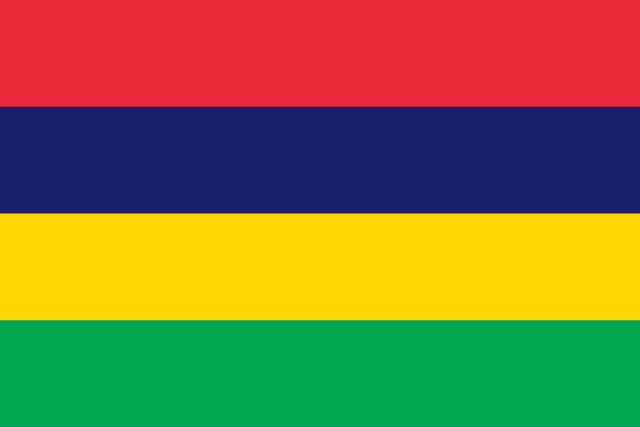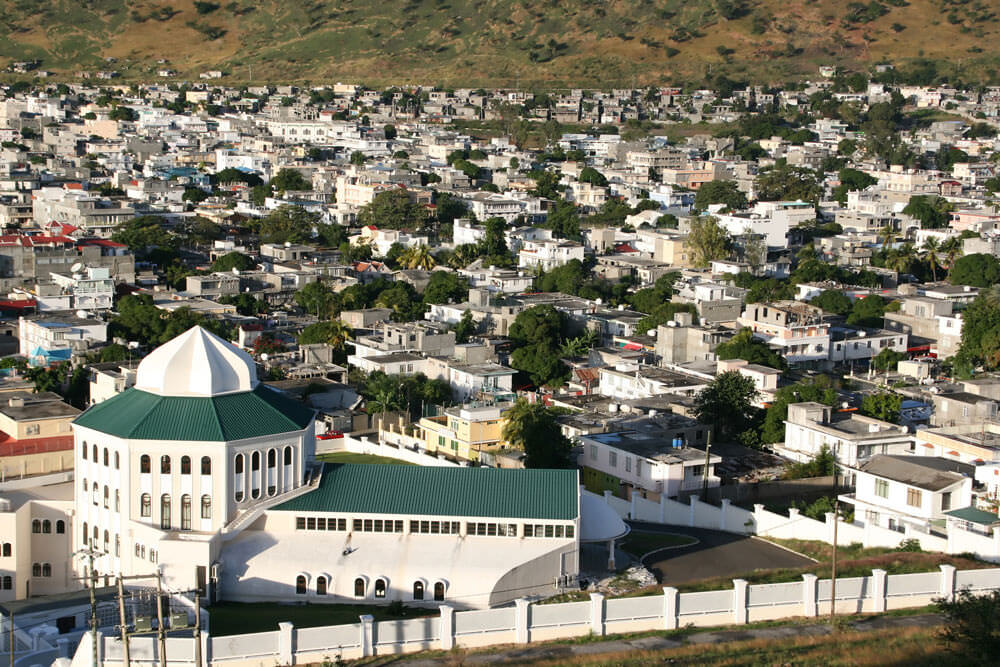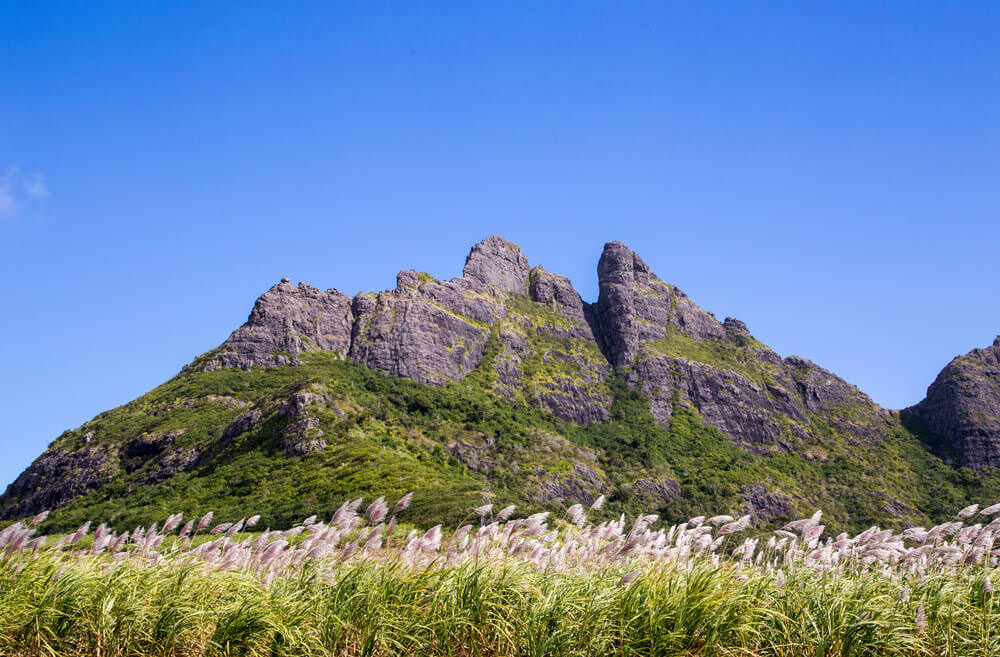Mauritius

Capital city: Port Louis
Population: 1,273,433 (2021)
Land area: 2,040 km²
Official language: English
Legal system: French civil law and common law
Time zone: GMT+4
Currency: Mauritian rupee (MUR)
GDP: 12.21 USD Billion (2021 est.)
Main industries: Food processing (largely sugar milling), textiles, clothing, mining, chemicals, metal products, transport equipment, nonelectrical machinery, tourism
Principal exports: Clothing and textiles, sugar, cut flowers, molasses, fish, primates (for research)

Demographics
According to World Bank 2022 estimates, the population of Mauritius is about 1,299,920 people, of which 40.8% live in urban areas, especially the capital of Port Louis. According to July 2020 estimates of the Mauritian government 40% of the population is under 30 years of age.
According to the last estimate taken on the ethnic census of the state in 2000, 67% of the Mauritian population is of Indo-Pakistani origin, followed by Creole (people of mixed French and African descent) constituting 27%, Chinese 3%. Although English is the official language, it is spoken by only a small fraction of the population, while Creole, a French-based language, is spoken most widely and is understood by 80% of Mauritians
History
From 1598 to 1710, the Dutch took possession of Mauritius and named the country after the then Governor Maurice of Nassau. Despite multiple attempts, the Dutch were unable to settle into the island and eventually left. In 1721, the French East India Company settled and named the territory Île de France and established the sugar planting industry. Governance was handed over to the French government before the British took over in 1814 via the Treaty of Paris and the original name of Mauritius was undertaken again for the territory, although it retained French laws, customs, and French as the commonly spoken language.
The country was, however, not settled until the French took over the country in the mid-18th century. Mauritius subsequently changed hands from the French to the British in the 1810s, but despite it being a British colony, the customs, laws, and language governing the nation remained French. When slavery was abolished in 1835, Indian and Pakistani nationals were brought in to work in the sugar industry, from which the current Indo-Pak population in Mauritius originates from. Henceforth, Mauritius underwent rapid development and economic prosperity especially in the 1850s until the Great Depression and World War 2 degraded the economy drastically. This led to political reforms that eventually gave the country independence within the Commonwealth on 12th of March 1968. The 1980s was a period of successful economic diversification that also had an impact on the political system and governance. Mauritius became a republic on the 24th anniversary of its independence, with the President, Cassam Uteem, as head of state. In 2015, a historic event took place when the country elected its first female president, Ameenah Gurib-Fakim, on the 5th of June.

Key Dates
10th century Phoenicians, Malays, Swahili, and Arab seamen reach island but do not settle.
1598 Dutch reach the island and rename it after their head of state, Maurice.
1814 Mauritius, Seychelles and Rodrigues ceded to Britain under Treaty of Paris.
1834 Slavery is abolished in Mauritius.
1926 Indo-Mauritians elected to government council for the first time.
1942 Donald Mackenzie-Kennedy becomes governor and introduces consultative committee, which includes representatives from all Mauritian communities for the first time.
1957 Internal self-government introduced, with an electoral system based on the Westminster model.
1959 First elections under universal adult suffrage; Labour Party of Seewoosagur Ramgoolam wins.
1968 Independence achieved on 12th of March.
1992 Prime Minister Jugnauth declares Mauritius a republic on March 12th.
2010 Mauritius and France agree to jointly manage Indian Ocean island Tromelin.
Legal System and Government
Prior to its transition to a republican state, Mauritius was a constitutional monarchy with the British monarch as head of state. Today, Mauritius is headed by a president, who is elected by a National Assembly every five years. The National Assembly is vested also with legislative power, while executive power is exercised by a Council of Ministers which is headed by a prime minister.
The country’s legal system is governed by a hybrid of civil law and English common law. Substantive Mauritian law is derived from the French Napoleonic Code; however, English common law is also employed for procedure and evidence, alongside financial and company law. The Supreme Court is divided into the Court of Civil Appeal and the Court of Criminal Appeal. The Intermediate and District Courts are magistrate courts; cases heard here can be appealed to the Supreme Court. The Privy Council of the United Kingdom is, however, the final court of appeal.
Economy
Despite Mauritius’ relatively small size, it boasts one of the most successful and competitive economies within Africa with an upper-middle income status. Though Mauritius previously relied heavily on the production and export or sugar cane, the country now enjoys a diversified economy; an impressive feat achieved by the Mauritius government in the last 40 years by encouraging the development of new markets which has resulted in exports of goods and services at a value of 44% of GDP. However, the country’s economy still owes its stability, in part, to the sale and export of sugar. At present, sugarcane is cultivated on 85% of the arable land in Mauritius, with around 530,000 tonnes of sugar being exported to the European Union. Sugar exports still represent approximately 19% of foreign exchange earnings. The agricultural sector contributed 3.3% of GDP in remainder of the arable land is used to grow tea, tobacco, potatoes and several other vegetables and fruits. The industrial sector of the nation contributes 18.3% of GDP, of which 12% comes from manufacturing; the main productions (aside from sugar) including textiles, seafood processing, agro-processing and pharmaceutical products.
Services comprise two-thirds of the nation’s GDP revenue. Mauritius’ tourism sector now forms one of its main economic pillars. Known as a luxury travel destination, tourists are mostly attracted by the country’s picturesque sceneries, its extravagant resorts, and its vibrant cultures. In 2019, Mauritius saw almost 1.5 million annual visitors, while tourism contributed to around 19.5% of GDP; while COVID-19 has definitely hampered this trend, tourism is gradually reviving. Financial services, particularly insurance activities, provides 13.1% of GDP, retail provides 11.5% while the remainder of the contributing services include transport, accommodation, ICT, real estate, and research and development.
Trade
Mauritius’s GDP stood at US$11.5 billion at the end of 2021. The main exports for the year included articles of apparel, knit or crocheted (13.8%), meat, fish, and seafood preparations (13.5%), articles of apparel, knit or crocheted (10.7%), and sugars and sugar confectionery (12%). These exports were predominantly exported to South Africa (13.8%), France (13.5%), UK (9.2%), and the US (8.4%).
The main imports in 2021 included mineral fuels, oils, distillation products (17.3%), machinery, nuclear reactors, boilers (6.9%), vehicles other than railway, tramway (6.2%), and electrical machinery and electronic equipment (6.0%). The main import suppliers were China (17.7%), India (15.6%), the UAE (8.8%), and South Africa (8.0%).
Mauritius is a member of the Common Market for Eastern and Southern Africa (COMESA), the Southern African Development Community (SADC) and the multilateral agreement between the EU and the Eastern and Southern African States.
Investment Opportunities
Mauritius’ financial and insurance services have grown steadily in recent years. As a result, its domestic financial services sector is now well-developed. In terms of its growing offshore sector, the Mauritius government aims to establish the country as an international financial and business centre. As many as 32,000 offshore commercial entities have established offices on the island, with many of these entities aiming at commerce in India, South Africa, and China.
To promote more foreign investment into Mauritius, the government began the Property Development Scheme in 2015 that allows foreign individuals to buy property in full ownership of an amount greater than US$500,000 and gain a residence permit for the individual and their family for as long as they remain owners of the property. Another initiative is the G+2 which, upon purchase of a condominium apartment (the building must have at least 2 floors) grants the individual a resident permit of upto 6 month. These investments will not be taxable in France. Furthermore, the new Mauritian Integrated Resort Scheme is open to foreign direct investment, allowing foreign investors to purchase land or property in Mauritius in pursuit of establishing a hotel or resort. As a popular travel destination for many people from the United States and Asia, participation on the Scheme could be an excellent opportunity to enter the Mauritian tourism industry.
Another interesting investment opportunity is in the country’s rum production that is rising in popularity. Due to Mauritius’s well-developed sugar and molasses production, it gives way to a unique and flavourful rum and the state would benefit from investment in its manufacturing and marketing.